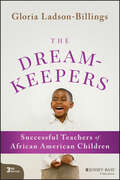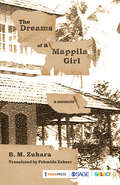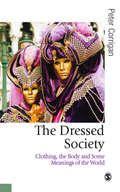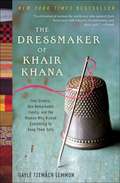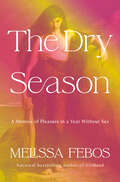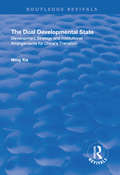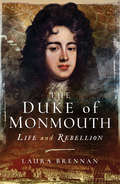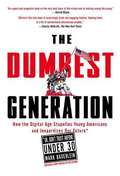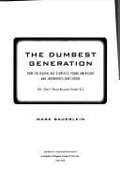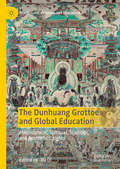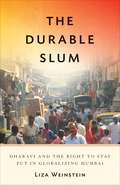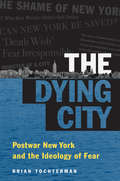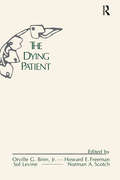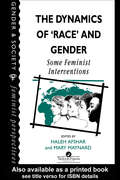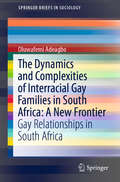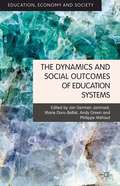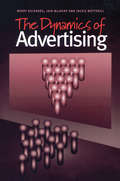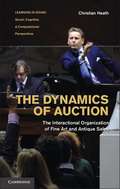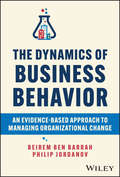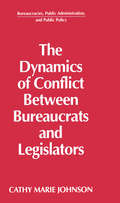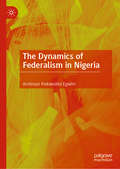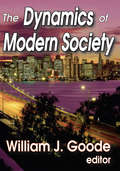- Table View
- List View
The Dreamkeepers: Successful Teachers of African American Children
by Gloria Ladson-BillingsDiscover how to give African American children the education they deserve with this updated new resource In the newly revised Third Edition of The Dreamkeepers: Successful Teachers of African American Children, distinguished professor Dr. Gloria Ladson-Billings delivers an encouraging exploration of the future of education for African American students. She describes eight exemplary teachers, all of whom differ in their personal style and methods, who share an approach to teaching that affirms and strengthens cultural identity. In this mixture of scholarship and storytelling, you’ll learn how to create intellectually rigorous and culturally relevant classrooms that have the power to improve the lives of all children. This important book teaches: What successful teachers do, don’t do, and what we can learn from them Why it’s so important for teachers to work with the unique strengths each student brings to the classroom How to improve educational outcomes for African American children across the country Perfect for teachers, parents, school leaders, and administrators, The Dreamkeepers will also earn a place in the libraries of school boards, professors of education, urban sociologists, and casual readers with an interest in issues of race and education.
The Dreams of a Mappila Girl: A Memoir
by B. M. Zuhara Fehmida Zakeer (Translator)‘I grew up at a time when Muslim girls did not even have the freedom to dream.’ As a young Muslim girl growing up in the 1950s in a small South Indian village, B. M. Zuhara had simple dreams—to go to the newly opened ‘talkies’ in town and watch a movie, play with her brothers in the rice fields, learn the ancient martial art of Kalari Payatu with them, stand on the bridge and listen to the songs sung by the farmhands as they worked. But she soon realised that even being the pampered, youngest child of her family would not help her in realising some of her dreams because of her gender. Set at the time when Independent India was embracing its new identity as a free nation, Dreams of a Mappila Girl provides a wide lens for the reader to view life in a semi-rural Kerala village. Zuhara recounts the social mores of the society she lived in and offers glimpses into the secluded lives of Muslim girls and women who, despite obstacles, made the best of their circumstances and contributed positively to their communities.
The Dressed Society: Clothing, the Body and Some Meanings of the World (Published in association with Theory, Culture & Society)
by Dr Peter CorriganIt was traditionally said that 'clothes maketh the man'. But what codes and meanings are associated with dress in a society that consists of divisions between class, race, gender, family status and religion? Is social and cultural life still fundamentally themed by the clothes that we wear? If so, how should we read these codes and themes in order to decipher their relation to power and meaning? This exhaustive book demonstrates how dress shapes and is shaped by social processes and phenomena such as beauty, time, the body, the gift exchange, class, gender and religion. It does this through an analysis of topics like the Islamic clothing controversy in state schools, the multitude of identities associated with dress, the Dress Reform movement, the construction of the body in fashion magazines and the role of the internet in fashion. What emerges is a trenchant, sharply observed account of the place of dress in contemporary society. The book will be of interest to students and researchers in Sociology, Cultural Studies, Women's Studies, Gender Studies, Anthropology and Fashion Studies.
The Dressmaker of Khair Khana: Five Sisters, One Remarkable Family, and the Woman Who Risked Everything to Keep Them Safe
by Gayle Tzemach LemmonThe life Kamila Sidiqi had known changed overnight when the Taliban seized control of the city of Kabul. After receiving a teaching degree during the civil war - a rare achievement for any Afghan woman - Kamila was subsequently banned from school and confined to her home. When her father and brother were forced to flee the city, Kamila became the sole breadwinner for her five siblings. Armed only with grit and determination, she picked up a needle and thread and created a thriving business of her own. The Dressmaker of Khair Khana tells the incredible true story of this unlikely entrepreneur who mobilized her community under the Taliban. Former ABC News reporter Gayle Tzemach Lemmon spent years on the ground reporting Kamila's story, and the result is an unusually intimate and unsanitized look at the daily lives of women in Afghanistan. These women are not victims; they are the glue that holds families together; they are the backbone and the heart of their nation. Afghanistan's future remains uncertain as debates over withdrawal timelines dominate the news. The Dressmaker of Khair Khana moves beyond the headlines to transport you to an Afghanistan you have never seen before. This is a story of war, but it is also a story of sisterhood and resilience in the face of despair. Kamila Sidiqi's journey will inspire you, but it will also change the way you think about one of the most important political and humanitarian issues of our time.
The Dry Season: A Memoir of Pleasure in a Year Without Sex
by Melissa FebosThe award-winning author of Girlhood returns with a revelatory chronicle of her year of celibacy and its transformative impact on her relationships—to others, and to herself.In the wake of a catastrophic two-year relationship, Melissa Febos decided to take a break—for three months she would abstain from dating and casual sex. Ever since her teens, she'd been in one entanglement after another. As she puts it, she could trace a &“daisy chain of romances&” from her adolescence to her mid-thirties. And no matter where her partners identified on the gender spectrum, she always instinctively molded herself to appeal to them.Over those first few months, she gleaned insights into her past and awoke to the joys of being single. She decided to extend her celibacy not knowing it would become the most sensual and satisfying year of her life. Unburdened by preoccupations that had consumed her for decades, she learned to relish the delights of solitude and the thrill of living on her own terms.A reckoning with lifelong patterns and dominant systems of power, The Dry Season puts Febos's experience into conversation with those of women throughout history—from Sappho to mystic nuns to Virginia Woolf—situating it within a lineage of queer and feminist role models in unapologetic pursuit of their ambitions and ideals.Blending intimate personal narrative and incisive cultural criticism, Febos tells a story that's as much about celibacy as it is about its inverse: pleasure, desire, fulfillment. Infused with her fearless honesty and keen intellect, it's the memoir of a woman learning to live at the centre of her story, and a much-needed catalyst for a more radical conversation around sex and love.
The Dual Developmental State: Development Strategy and Institutional Arrangements for China's Transition
by Ming XiaThis title was first published in 2000: The developmental state model, which originated in Japan, has ascended to the status of the leading paradigm for the East Asian political economy. This text explores the proposition of many specialists, that China has emulated the model and become part of the flying geese pattern of development.
The Duke of Havana
by Steve Fainaru Ray SánchezIn 1998, a mysterious right-handed pitcher helped lead the N. Y. Yankees to a World Championship. <P><P> Named Orlando "El Duque" Hernandez, he was a fallen hero of Fidel Castro's socialist revolution. <P><P>Once hailed as a paragon of Castro's revolution, the finest pitcher in modern Cuban history was banned from baseball for life for allegedly plotting to defect. <P><P>But he fearlessly fought back, defying the Communist party authorities, vowing to pitch again, and ultimately fleeing his country in a 30-foot fishing boat. Here are the secrets behind El Duque's persecution and escape. <P><P> A true story of cloak-&-dagger adventure, secret plots, and the pull of big money.
The Duke of Monmouth: Life and Rebellion
by Laura BrennanHe was the illegitimate son of a king, a gallant and brave military hero, charming, handsome and well loved both within the court and with women; James Scott, Duke of Monmouth, had the life many would have envied in the seventeenth century.Monmouth lived in an age that was on the cusp of modernity. He lived through some of the biggest events and scandals of seventeenth century British history, including: the Restoration of his father, King Charles II; The Great Fire of London in 1666 and the last great plague to sweep through London killing thousands.James also experienced the political scandal of the Popish Plot; became embroiled in the foiled Rye House Plot, and was at the centre of the Exclusion Crisis, which was a major catalyst for the modern creation of our party political system.But what would turn the beloved darling of the Restoration court into a leading rebel?
The Dumbest Generation
by Mark BauerleinThis shocking, surprisingly entertaining romp into the intellectual nether regions of today's underthirty set reveals the disturbing and, ultimately, incontrovertible truth: cyberculture is turning us into a society of know-nothings. .
The Dumbest Generation
by Mark BauerleinThis shocking, surprisingly entertaining romp into the intellectual nether regions of today's underthirty set reveals the disturbing and, ultimately, incontrovertible truth: cyberculture is turning us into a society of know-nothings. The Dumbest Generation is a dire report on the intellectual life of young adults and a timely warning of its impact on American democracy and culture. For decades, concern has been brewing about the dumbed-down popular culture available to young people and the impact it has on their futures. But at the dawn of the digital age, many thought they saw an answer: the internet, email, blogs, and interactive and hyper-realistic video games promised to yield a generation of sharper, more aware, and intellectually sophisticated children. The terms "information superhighway" and "knowledge economy" entered the lexicon, and we assumed that teens would use their knowledge and understanding of technology to set themselves apart as the vanguards of this new digital era. That was the promise. But the enlightenment didn't happen. The technology that was supposed to make young adults more aware, diversify their tastes, and improve their verbal skills has had the opposite effect. According to recent reports from the National Endowment for the Arts, most young people in the United States do not read literature, visit museums, or vote. They cannot explain basic scientific methods, recount basic American history, name their local political representatives, or locate Iraq or Israel on a map. The Dumbest Generation: How the Digital Age Stupefies Young Americans and Jeopardizes Our Future is a startling examination of the intellectual life of young adults and a timely warning of its impact on American culture and democracy. Over the last few decades, how we view adolescence itself has changed, growing from a pitstop on the road to adulthood to its own space in society, wholly separate from adult life. This change in adolescent culture has gone hand in hand with an insidious infantilization of our culture at large; as adolescents continue to disengage from the adult world, they have built their own, acquiring more spending money, steering classrooms and culture towards their own needs and interests, and now using the technology once promoted as the greatest hope for their futures to indulge in diversions, from MySpace to multiplayer video games, 24/7. Can a nation continue to enjoy political and economic predominance if its citizens refuse to grow up? Drawing upon exhaustive research, personal anecdotes, and historical and social analysis, The Dumbest Generation presents a portrait of the young American mind at this critical juncture, and lays out a compelling vision of how we might address its deficiencies. The Dumbest Generation pulls no punches as it reveals the true cost of the digital age--and our last chance to fix it.
The Dumbest Generation: How the Digital Age Stupefies Young Americans and Jeopardizes Our Future (or, Don't Trust Anyone Under #30)
by Mark BauerleinThis shocking, lively exposure of the intellectual vacuity of today's under thirty set reveals the disturbing and, ultimately, incontrovertible truth: cyberculture is turning us into a nation of know-nothings. Can a nation continue to enjoy political and economic predominance if its citizens refuse to grow up? For decades, concern has been brewing about the dumbed-down popular culture available to young people and the impact it has on their futures. At the dawn of the digital age, many believed they saw a hopeful answer: The Internet, e-mail, blogs, and interactive and hyper-realistic video games promised to yield a generation of sharper, more aware, and intellectually sophisticated children. The terms "information superhighway" and "knowledge economy" entered the lexicon, and we assumed that teens would use their knowledge and understanding of technology to set themselves apart as the vanguards of this new digital era. That was the promise. But the enlightenment didn't happen. The technology that was supposed to make young adults more astute, diversify their tastes, and improve their verbal skills has had the opposite effect. According to recent reports, most young people in the United States do not read literature, visit museums, or vote. They cannot explain basic scientific methods, recount basic American history, name their local political representatives, or locate Iraq or Israel on a map. The Dumbest Generationis a startling examination of the intellectual life of young adults and a timely warning of its consequences for American culture and democracy. Drawing upon exhaustive research, personal anecdotes, and historical and social analysis, Mark Bauerline presents an uncompromisingly realistic portrait of the young American mind at this critical juncture, and lays out a compelling vision of how we might address its deficiencies.
The Dunhuang Grottoes and Global Education: Philosophical, Spiritual, Scientific, and Aesthetic Insights (Spirituality, Religion, and Education)
by Xu DiThis book analyzes the murals and texts of the Dunhuang Grottoes, one of the most famous sites of cultural heritage on the Silk Road in Northwest China, from an educational perspective. The Dunhuang Grottoes are well-known in the world for their stunning beauty and magnificence, but the teaching of Dunhuang advocates a philosophical perspective that cosmos, nature, and humanity are an interconnected whole, and that all elements function interactively according to universal and relational principles of continuity, cause-and-effect, spiritual connection, and enlightenment. Xu Di and volume contributors highlight the moral education and ethics found throughout the Dunhuang with numerous stories of the personal journeys and growth of the Buddha and bodhisattvas, discussing and analyzing these teachings, and their possible implications for modern education systems throughout China and the world today.
The Durable Slum: Dharavi and the Right to Stay Put in Globalizing Mumbai (Globalization and Community #23)
by Liza WeinsteinIn the center of Mumbai, next to the city&’s newest and most expensive commercial developments, lies one of Asia&’s largest slums, where as many as one million squatters live in makeshift housing on one square mile of government land. This is the notorious Dharavi district, best known from the movie Slumdog Millionaire. In recent years, cities from Delhi to Rio de Janeiro have demolished similar slums, at times violently evicting their residents, to make way for development. But Dharavi and its residents have endured for a century, holding on to what is now some of Mumbai&’s most valuable land. In The Durable Slum, Liza Weinstein draws on a decade of work, including more than a year of firsthand research in Dharavi, to explain how, despite innumerable threats, the slum has persisted for so long, achieving a precarious stability. She describes how economic globalization and rapid urban development are pressuring Indian authorities to eradicate and redevelop Dharavi—and how political conflict, bureaucratic fragmentation, and community resistance have kept the bulldozers at bay. Today the latest ambitious plan for Dharavi&’s transformation has been stalled, yet the threat of eviction remains, and most residents and observers are simply waiting for the project to be revived or replaced by an even grander scheme.Dharavi&’s remarkable story presents important lessons for a world in which most population growth happens in urban slums even as brutal removals increase. From Nairobi&’s Kibera to Manila&’s Tondo, megaslums may be more durable than they appear, their residents retaining a fragile but hard-won right to stay put.
The Dwelling Place of Light -- Volume 3
by Winston ChurchillThe Dwelling-Place of Light, published in 1917, centers on labor unrest in a Massachusetts mill town. Strikingly realistic, the novel does not shy from harsh depictions of the poor working conditions in the mill, nor of the violent tenor of the workers' anger. And Churchill's shrewd eye observes domestic matters as well, with his astute dramatizations of romance and married life.
The Dying City: Postwar New York and the Ideology of Fear (Studies in United States Culture)
by Brian L. TochtermanIn this eye-opening cultural history, Brian Tochterman examines competing narratives that shaped post–World War II New York City. As a sense of crisis rose in American cities during the 1960s and 1970s, a period defined by suburban growth and deindustrialization, no city was viewed as in its death throes more than New York. Feeding this narrative of the dying city was a wide range of representations in film, literature, and the popular press--representations that ironically would not have been produced if not for a city full of productive possibilities as well as challenges. Tochterman reveals how elite culture producers, planners and theorists, and elected officials drew on and perpetuated the fear of death to press for a new urban vision. It was this narrative of New York as the dying city, Tochterman argues, that contributed to a burgeoning and broad anti-urban political culture hostile to state intervention on behalf of cities and citizens. Ultimately, the author shows that New York's decline--and the decline of American cities in general--was in part a self-fulfilling prophecy bolstered by urban fear and the new political culture nourished by it.
The Dying Patient
by Orville G. Brim, Jr., Howard E. Freeman, Sol Levine and Norman A. Scotch"Recommended for the provocative questions it raises concerning the effect on the patient of the structure of medical care, concerning the important decisions regarding policy facing the medical profession, the hospital administrator, and the public, and for the discussions of legal and economic dimensions which are frequently forgotten by personnel working directly with the patient." - Edmund C. Payne, Psychiatry in Medicine. The fourteen original articles in The Dying Patient examine the problems of dying and medical conduct from the perspectives of sociology, economics, medicine, and the law.
The Dynamics Of Race And Gender: Some Feminist Interventions (Gender And Society Ser.)
by Haleh Afshar Mary MaynardDuring the past decade, feminism and women's studies have been forced to acknowledge the diversities of women's experiences, as well as the patriarchal oppression that they share. The emphasis on difference has shattered the illusion of homogeneity and sisterhood which previously characterized white, middle-class Westernized feminist politics and analysis.; There is relatively little work which concentrates on the inter-relationships of race and gender in general, and the consequences of racism, for women of different backgrounds, in particular. "The Dynamics of Race and Gender" aims to contribute to the debate and understanding in this area. Emphasis has been given to age, class, disability, race and sexuality. The contributors to this volume are from different religious, cultural and ethnic backgrounds, giving a balanced and broad ranging perspective on this important social question.; Organized around three main themes, which are; issues of theory and method, questions of identity, racism and sexism at work, the chapters of this book indicate how the processes of race and gender interrelate in highly complex and contradictory ways. Demonstrating the benefits to be gained from analysing the interplay of various axes of differentiation in specific empirical and historical locations, and in doing so, under- scoring the point that diversity among women cannot be seen as a static phenomenon.
The Dynamics and Complexities of Interracial Gay Families in South Africa: Gay Relationships In South Africa (Springerbriefs In Sociology)
by Oluwafemi AdeagboThis book provides an in-depth account of a qualitative study on the familial arrangements and domestic settings shaping interracial gay partnerships in the South African context, and it offers both empirical and theoretical insights on the topic. While heterosexual intimate relationships, particularly mixed-race couples, have attracted societal and scholarly attention in South Africa due to the country’s past history of racial segregation, it is, however, striking how little emphasis is placed on understanding same-sex unions in a transforming South Africa. This book is timely and important because it explores the vignettes, complexities and dynamics of interracial gay intimate relationships, an area that hardly gets the scholarly attention it deserves. The book addresses the intersectionality, and the question of how sexuality, gender, racial identity and personal resources influence the relationship as well as the way resilience strategies are drawn upon to sustain the partnership.
The Dynamics and Social Outcomes of Education Systems
by Andy Green Jan Germen Janmaat Marie Duru-Bellat Philippe M�hautThis collection critically examines the dynamics and social outcomes of systems of lifelong learning.
The Dynamics of Advertising
by Iain MacRury Jackie Botterill Barry RichardsThe authors suggest that advertisments, while important in our daily emotional self-management, are far more closely linked to the pragmatics of everyday life than their symbolic richness might suggest. Recent trends in advertisment content point to an important shift in our relationship to goods that reflects an increasing preoccupation with risk management.
The Dynamics of Auction
by Christian HeathEach year art and antiques worth many billions of pounds are sold at auction. These auctions consist of numerous, intense episodes of social interaction through which the price of goods rapidly escalates until sold on the strike of a hammer. In this book, Christian Heath examines the fine details of interaction that arises at auctions, the talk and visible conduct of the participants and their use of various tools and technologies. He explores how auctioneers, buyers and their representatives are able to transact the sale of diversely priced goods in just seconds. Heath addresses how order, trust and competition are established at auctions and demonstrates how an economic institution of some global importance is founded upon embodied action and interaction. The analysis is based on video recordings of sales of art and antiques gathered within a range of national and international auction houses in Europe and the United States.
The Dynamics of Business Behavior: An Evidence-Based Approach to Managing Organizational Change
by Beirem Ben Barrah Philip JordanovDiscover practical and relevant insights from behavioral science you can apply immediately to manage change in your organization In The Dynamics of Business Behavior: An Evidence-Based Approach to Managing Organizational Change, cognitive neuropsychologist Philip Jordanov and entrepreneur Beirem Ben Barrah deliver an eye-opening new treatment of how to create organizational change with an evidence-based approach. The book includes interviews with more than 40 industry professionals across 15 sectors from companies like Johnson & Johnson and the three biggest Dutch banks discussing change approaches, challenges, and interventions to help bridge the gap between theory and practice. Readers will find useful step-by-step guides on eighteen interventions for six change areas, including psychological safety for stakeholder engagement and re-anchoring for leadership support. This book also discusses: The importance of strategic planning and risk management in DEI efforts through surveys and focus groups, yearly health scans, and qualitative and quantitative data The most common myths that leaders accidentally buy into as they guide their organizations Case studies of contemporary companies overcoming challenges using brain and behavior science A startlingly insightful and, at times, counterintuitive guide to implementing behavioral science in real-world organizations, The Dynamics of Business Behavior: An Evidence-Based Approach to Managing Organizational Change will earn a place on the bookshelves of managers, executives, directors, entrepreneurs, founders, marketers, department heads, salespeople, and other business leaders.
The Dynamics of Conflict Between Bureaucrats and Legislators
by Gail JohnsonFirst Published in 1993. Routledge is an imprint of Taylor & Francis, an Informa company.
The Dynamics of Federalism in Nigeria
by Ambrose Ihekwoaba EgwimThis book analyzes the concept “true federalism” to examine whether there are definable dimensions of power-sharing that make ‘true federalism.’ The author takes a critical look at dimensions on political restructuring in Nigeria, which have been termed “true federalism.” The work fills a significant gap in the existing literature on the theory and practice of federalism. The project will be useful to the students and professors of African Studies, political science, Nigeria federalism, public administration and policy. Additionally, the monograph will be interesting to the general public who seek to know more about contemporary issues in Nigeria.
The Dynamics of Modern Society
by J. Goode WilliamSocial research efforts are often more concerned with basic social processes or patterns than with the dynamic relationship between social processes and social institutions. In this classic collection, contributors posit generalizations drawn from contemporary sociology. Their analyses go beyond elementary principles - they interpret them, qualify them, or state them more precisely. Each of the contributors focuses on the modern American social structure, and they are either explicitly comparative or have made observations that clearly are meant to apply to many countries.This volume both embodies and draws attention to newer developments in sociology. Like most steps forward in an advancing science, this orientation does not reject the older knowledge accumulated during earlier generations, but incorporates and expands upon it. The differences are in emphasis rather than any denial of the main body of accepted theory. On the other hand, the collection may be said to represent a response to the many criticisms, by humanists and sociologists alike, of the mainstream of contemporary sociology as it existed at the time of original publication in the late 1960s.Inquiries into social changes, like sociological studies of historical phenomena, may be viewed as modes of a comparative sociology: They permit us to test more fully sociological generalizations. The emphasis in this volume on historical and comparative studies and on social change parallels the growing attention of sociology to these problems. During the 1960s, social science turned from a nearly exclusive preoccupation with middle-class populations to a concern with social relations in other societies, past as well as present. In addition to enriching our knowledge, this broader view has increased both the precision and generalizing power of sociological principles.
